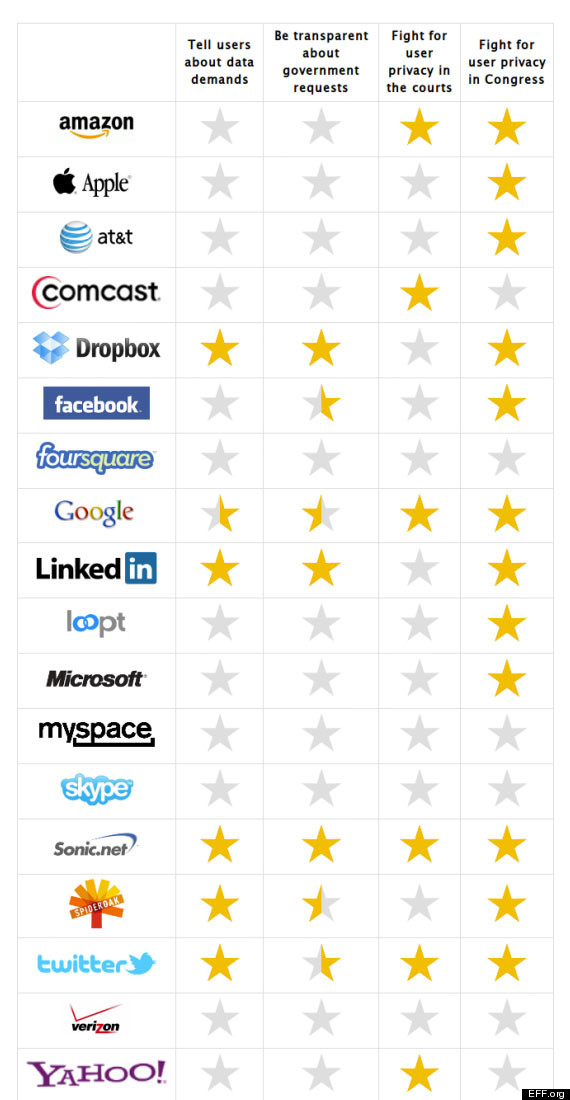Online privacy is no small issue nowadays, with millions of users across the world depending on Internet companies like Google, Facebook and Twitter to protect their personal data no matter who asks for it -- including the government.
In a new report released this week, the Electronic Frontier Foundation (EFF) evaluated 18 major web companies to discover which of them will work hardest to protect your data, should the government come a-knockin' at their doors.
Fortunately, after reviewing the companies' terms of service, privacy policies, published law enforcement guides, and privacy protection histories, the digital rights advocacy group found that, across the board, Internet companies are working harder to be more transparent with users about how their data is protected and when it might be shared.
"Online service providers are the guardians of some of your most intimate data–everything from your messages, to location information, to the identities of your family and friends," EFF senior staff attorney Marcia Hofmann told Ars Technica in a statement. "We wanted to acknowledge companies that are adopting best practices and taking exceptional steps to defend their users against government overreaches in the courts and in Congress."
Of the 18 Internet companies the digital rights advocacy group reviewed, only telephone and internet service provider Sonic.net received four stars. The EFF's evaluation criteria, each of which is worth one star, were "Tell users abut data demands," "Be transparent about government requests," "Fight for users privacy in the courts" and "Fight for user privacy in Congress."
Twitter came at a close second with three and a half stars, having earned only half a star in the "Be transparent about government requests" category. As the L.A. Times points out, Twitter recently proved its willingness to protect users' privacy in a case involving Malcolm Harris, a Twitter user charged with disorderly conduct during an Occupy Wall Street protest. The social networking site had refused to share his information with the prosecution.
However, companies like Apple, Yahoo and Microsoft received only one star, while Skype, Myspace, Foursquare and Verizon didn't receive any at all.
It's important to note that, as a digital rights advocacy group, the EFF may have judged each company pretty harshly. Then again, both Myspace and Skype have recently encountered controversy for their poor performance in protecting user data - so their results might not be too far off.
You can view all of EFF's results on its website, or check out the chart below. What surprised you most about these findings? Let us know in the comments.
Original Article
Source: huffington post
Author: Courteney Palis
In a new report released this week, the Electronic Frontier Foundation (EFF) evaluated 18 major web companies to discover which of them will work hardest to protect your data, should the government come a-knockin' at their doors.
Fortunately, after reviewing the companies' terms of service, privacy policies, published law enforcement guides, and privacy protection histories, the digital rights advocacy group found that, across the board, Internet companies are working harder to be more transparent with users about how their data is protected and when it might be shared.
"Online service providers are the guardians of some of your most intimate data–everything from your messages, to location information, to the identities of your family and friends," EFF senior staff attorney Marcia Hofmann told Ars Technica in a statement. "We wanted to acknowledge companies that are adopting best practices and taking exceptional steps to defend their users against government overreaches in the courts and in Congress."
Of the 18 Internet companies the digital rights advocacy group reviewed, only telephone and internet service provider Sonic.net received four stars. The EFF's evaluation criteria, each of which is worth one star, were "Tell users abut data demands," "Be transparent about government requests," "Fight for users privacy in the courts" and "Fight for user privacy in Congress."
Twitter came at a close second with three and a half stars, having earned only half a star in the "Be transparent about government requests" category. As the L.A. Times points out, Twitter recently proved its willingness to protect users' privacy in a case involving Malcolm Harris, a Twitter user charged with disorderly conduct during an Occupy Wall Street protest. The social networking site had refused to share his information with the prosecution.
However, companies like Apple, Yahoo and Microsoft received only one star, while Skype, Myspace, Foursquare and Verizon didn't receive any at all.
It's important to note that, as a digital rights advocacy group, the EFF may have judged each company pretty harshly. Then again, both Myspace and Skype have recently encountered controversy for their poor performance in protecting user data - so their results might not be too far off.
You can view all of EFF's results on its website, or check out the chart below. What surprised you most about these findings? Let us know in the comments.
Original Article
Source: huffington post
Author: Courteney Palis


No comments:
Post a Comment